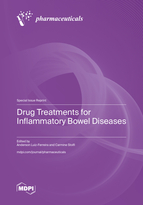Drug Treatments for Inflammatory Bowel Diseases
A special issue of Pharmaceuticals (ISSN 1424-8247). This special issue belongs to the section "Pharmacology".
Deadline for manuscript submissions: closed (29 August 2023) | Viewed by 25035
Special Issue Editors
Interests: experimental colitis; inflammation; ulcerative colitis; oxidative stress; colorectal cancer; Crohn’s disease
Interests: colorectal cancer; immunotherapy; inflammatory bowel diseases; anti-cancer drugs
Special Issues, Collections and Topics in MDPI journals
Special Issue Information
Dear Colleagues,
Inflammatory bowel diseases (IBD), including Crohn's disease (CD) and ulcerative colitis (UC), are idiopathic, relapsing, and remitting chronic inflammatory diseases that affect the gastrointestinal tract, bringing significant morbidity and loss of quality of life for the affected individuals. In UC, the inflammation is mostly restricted to the mucosa and involves only the colon, although the extent of colonic involvement may vary among patients and over time. In CD, the inflammatory process is transmural, affecting any portion of the gastrointestinal tract from the mouth to the anus, and may be associated with penetrating phenomena such as intraperitoneal abscesses or fistulas. Although the etiology is unknown, the interaction of environmental factors with the gut microbiota of a genetically susceptible host is believed to lead to the abnormal colonic mucosal immune response seen in these diseases.
Current pharmacological strategies for the management of IBD include the use of aminosalicylates, corticosteroids, thiopurines, cyclosporine, and biological therapies. These drugs aim to silence both active and chronic inflammation and prevent the progression of the disease, with the ultimate goal to induce clinical, biochemical, and endoscopic remission. However, a high percentage of individuals do not respond or lose response to treatments over time, and a prolonged use of such therapeutics can even result in side effects that, other than the disease itself, contribute to reducing the patients' quality of life. For these reasons, the search for new therapeutic targets/approaches to better manage the symptoms of these serious diseases as well as therapy-related potential side effects is worth pursuing.
This Special Issue of Pharmaceuticals, entitled “Drug Treatments for Inflammatory Bowel Diseases”, focuses on the most recent and relevant advances in new/potential drugs and therapies, which have shown promising results in preclinical studies and may represent effective future strategies for the management of these serious diseases. In this regard, the Special Issue welcomes original research articles, short communications, basic science reviews, as well as case studies and clinical trials.
Prof. Dr. Anderson Luiz-Ferreira
Dr. Carmine Stolfi
Guest Editors
Manuscript Submission Information
Manuscripts should be submitted online at www.mdpi.com by registering and logging in to this website. Once you are registered, click here to go to the submission form. Manuscripts can be submitted until the deadline. All submissions that pass pre-check are peer-reviewed. Accepted papers will be published continuously in the journal (as soon as accepted) and will be listed together on the special issue website. Research articles, review articles as well as short communications are invited. For planned papers, a title and short abstract (about 100 words) can be sent to the Editorial Office for announcement on this website.
Submitted manuscripts should not have been published previously, nor be under consideration for publication elsewhere (except conference proceedings papers). All manuscripts are thoroughly refereed through a single-blind peer-review process. A guide for authors and other relevant information for submission of manuscripts is available on the Instructions for Authors page. Pharmaceuticals is an international peer-reviewed open access monthly journal published by MDPI.
Please visit the Instructions for Authors page before submitting a manuscript. The Article Processing Charge (APC) for publication in this open access journal is 2900 CHF (Swiss Francs). Submitted papers should be well formatted and use good English. Authors may use MDPI's English editing service prior to publication or during author revisions.
Keywords
- inflammatory bowel diseases
- ulcerative colitis
- Crohn’s disease
- biologic therapy
- gut inflammation
- clinical trials
- cytokines
- gut microbiota
- gut dysbiosis
- innate and adoptive immunity








